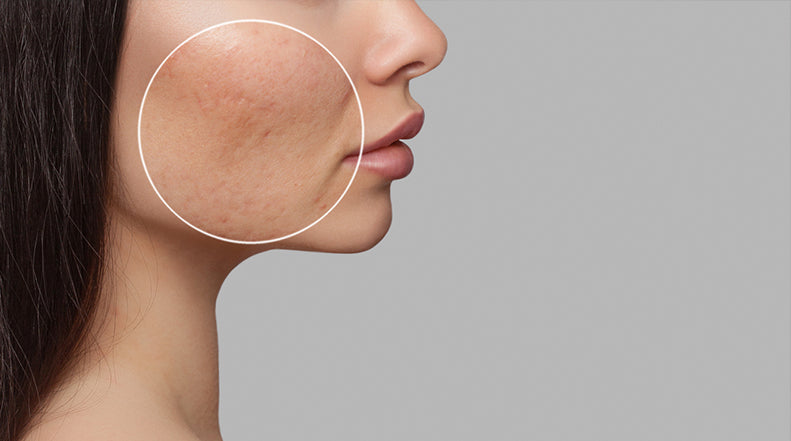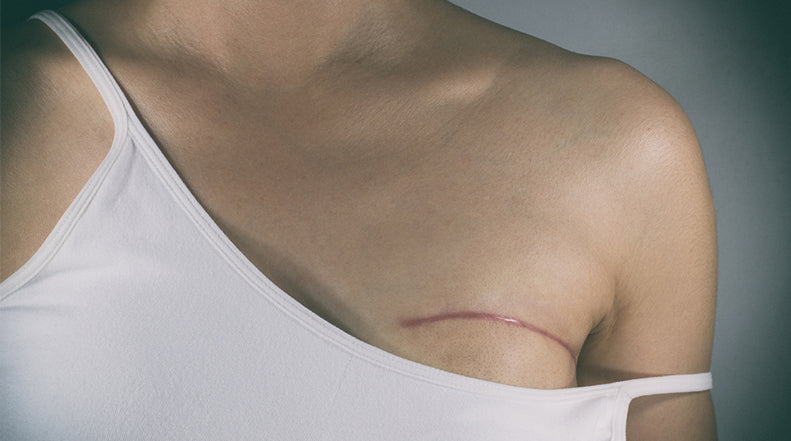Can Silicone Gel Help Treat Acne Scars?

Did you know that silicone gel products are recommended as the first-line, non-invasive option for both the prevention and treatment of scars? With over three decades of use in scar management, silicone gel is trusted by doctors, pharmacists, and patients to safely and effectively improve the appearance of scars. But here’s one thing you may be wondering: can silicone gel work for any type of scar? What about those stubborn scars that came along after all those years of teenage acne? Read on to find out whether or not silicone gel can help with acne scars.
TYPES OF ACNE SCARS
Acne scars are the result of damage to the skin during the healing of active acne. As with any injury to the skin, acne lesions follow the four main steps of the wound healing process: hemostasis, inflammation, new tissue formation, and matrix remodeling.
Hemostasis occurs only if the acne lesion is severe enough that bleeding occurs. Once the wound has clotted to stop the bleeding, the lesion will become inflamed due to immune cells entering the area. Studies have found that a strong relationship exists between severity and duration of inflammation and the development of scarring.
Once the damaged tissues are repaired, cells called fibroblasts initiate new production of collagen, the structural protein that gives the skin its firmness and durability. During this remodeling of the extracellular matrix (ECM), certain enzymes are released that determine how much collagen is produced. The type of scar that results depends on whether there is a net loss or gain of collagen. A net loss of collagen leads to atrophic scarring, which appears as sunken pits in the skin, whereas a net gain of collagen results in hypertrophic scars or keloids, which are raised, discolored scars.
Eighty to ninety percent of people with acne scars have scars associated with a loss of collagen (atrophic scars) compared to hypertrophic scars and keloids. Unfortunately, there is no topical treatments that are effective in raising sunken atrophic scars. It is best to treat resolving scars such as acne scars early before they sink, while they are still red.
Only a minority of people will develop a keloid or hypertrophic scarring due to acne. These scars are caused by excess collagen deposition, leading to a raised, firm scar that can be lumpy in appearance. Hypertrophic and keloidal scars are more common in darker-skinned individuals.
TREATMENTS FOR ACNE SCARS
Unfortunately, once an atrophic scar has lost collagen and become pitted in the skin, no topical treatment can raise the scar. Atrophic scars require treatments by a dermatologist, such as chemical peels, dermabrasion procedures, laser treatments, or even surgical excisions. Due to the relationship between the severity of acne inflammation and post-acne scars, treating early inflammation in acne lesions may be the best approach to prevent acne scarring. Therefore, it is important to treat resolving acne scars as early as possible, while they are still red and before they sink. This is where silicone gel can help with acne scars.
According to a review article published in Dermatology Research and Practice, silicone-based products represent one of the most common and effective solutions in preventing and also in the treatment of hypertrophic acne scars and keloids. Topical silicone gel was introduced to overcome the challenges of using silicone gel sheets in difficult areas, such as the face where acne is most common. Furthermore, silicone gel has several other advantages besides convenience: it is transparent, quick drying, non-irritating, and it can be used to treat extensive scars and uneven areas of skin.
NewGel+ offers two sizes of topical silicone gel that can be applied to prevent the formation of acne scars. The medical grade silicone gel is also enhanced with vitamin E, an antioxidant that helps to soften, moisturize, and protect the skin. This soft, silky feeling gel is not sticky and leaves no odor or residue - unlike many other silicone gels. By starting treatment early, NewGel+E can help to heal acne lesions with less inflammation, which decreases the risk of scarring. Plus, if your acne healed into a hypertrophic scar or keloid, NewGel+E has been clinically proven to reduce, flatten, and fade these types of scars safely and effectively.




Comments